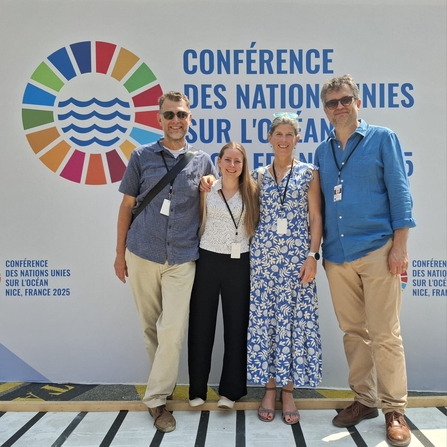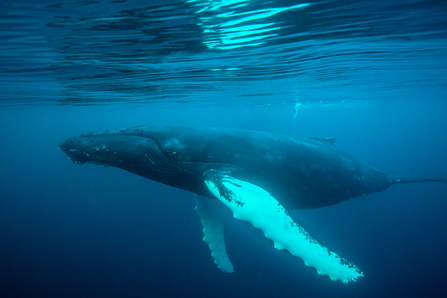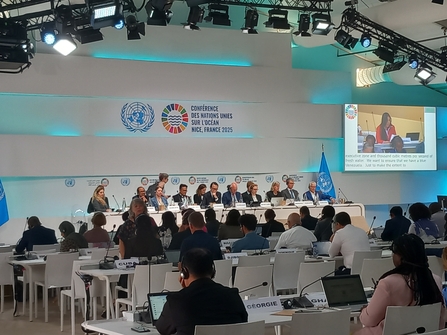I am just back from a week in Nice where, together with our small team of four staff from The Wildlife Trusts, we have been fully immersed in the third United Nations Ocean Conference.
Our Ocean, Our Future, Our Responsibility

It was an overwhelming, often chaotic tornado of delegate panel discussions, plenaries, side events, meetings to promote our work (particularly our world-first blue carbon reports), and making new connections with people from across the globe.
Personally, I gained a lot, but has this gathering of 64 Heads of State and 12,000 delegates actually made a difference to protecting our ocean?
More talk than action?
It felt a bit like a conference of two halves. The overarching theme of the Conference was “Accelerating action and mobilizing all actors to conserve and sustainably use the ocean”, and at many points it felt like yet another UN summit made up of Government delegations ‘talking the talk’ with too few solid actions made to progress action to save our seas.
There was a lot of ‘underscoring’ of things we ‘need’ and ‘should’ do, but in many of the panel discussions that were linked to each of the ten themes under Sustainable Development Goal 14 – Life below water, there seemed to be little actual action.
Some positive announcements
But there were also some really positive announcements made.
There was an ongoing buzz around the conference zone as more and more countries signed up to ratifying the UN Agreement on Biodiversity Beyond National Jurisdiction (BBNJ), or the High Seas Treaty.
50 countries have now ratified the treaty and others, including the UK have committed to ratification by the end of the year, which means it will get the 60 needed to bring it into force. But there is a lot of work ahead.

Humpback whale (c) Richard Shucksmith/scotlandbigpicture.com
Once enacted, BBNJ will provide the legal mechanism for creation of Marine Protected Areas in the high seas, international waters that cover two thirds of our ocean and which are currently vulnerable to unstainable fishing and extraction.
Several countries made big announcements regarding Marine Protected Areas (MPAs) in their waters, including French Polynesia who are fully protecting a further 1.1million km2 within what is now the largest MPA in the world covering their full Exclusive Economic Zone and a total area of 5 million km2. Impressive! In the words of our new Director of International, ‘These are not ‘Small Island States’ anymore, they are ‘Large Island Reserves!’
And of course, the UK Government announced it has opened a consultation to ban bottom trawling from 41 of our English offshore MPAs to protect the seabed.
This is welcome and long overdue and if all proposals are brought in could increase our progress towards the target of 30x30 by 13%. We fully support protecting these seabed sites which will not only protect the wildlife but also the carbon stored within, a win:win for nature and climate.
Please do add your voice to our campaign to ensure these proposals don't get weakened and are implemented as rapidly as possible.

A growing urgency… but also a growing hope
In other news, the moratorium on deep sea mining was supported by 37 countries, but not yet implemented. 37 countries launched a coalition for a quiet ocean to tackle noise pollution on a global scale. The need for all decisions to be underpinned by science, for equitable ocean literacy, and the urgent need for more blue finance were all highlighted.
This last point is sadly not being given the priority required, made clear in the UK as the Comprehensive Spending Review (CSR) has no headline mention of marine funding allocation, something that has to be rectified if we are to fulfil all commitments made at UNOC!
As Defra consider their CSR allocation over the coming weeks, we hope that Ministers recognise the need to follow up warm words in Nice with funding commitments.
There was an over-riding sense of urgency but also hope within the civil society sectors and the many hundreds of NGOs attending to share knowledge, learn, collaborate and mobilise.
I was incredibly proud to represent The Wildlife Trusts movement, members and partners, and genuinely feel optimistic for what the future of marine conservation holds: as long as these global discussions are translated effectively and rapidly into local action on the ground.
My head is bursting with ideas and my enthusiasm boosted following so many positive discussions with like-minded people providing hope that we are going in the right direction for ocean recovery.
Commitments and Government talking happens at this global level, but working with local communities and grassroots organisations is integral to finding positive, workable solutions and ensuring the high-level talk is translated to action on the ground.
The challenge to ensure our shared ocean recovers remains a huge one, but it also remains entirely possible, we just need more Government ambition and more action.
And to end on a quote from Peter Thomson, United Nations Secretary-General's Special Envoy for the Ocean: "The time for half measures is over. It is not what happens at the United Nations Ocean Conference that matters, it's what happens after it."
The time for action is now and that’s just what we at The Wildlife Trusts aim to do, with your support.

